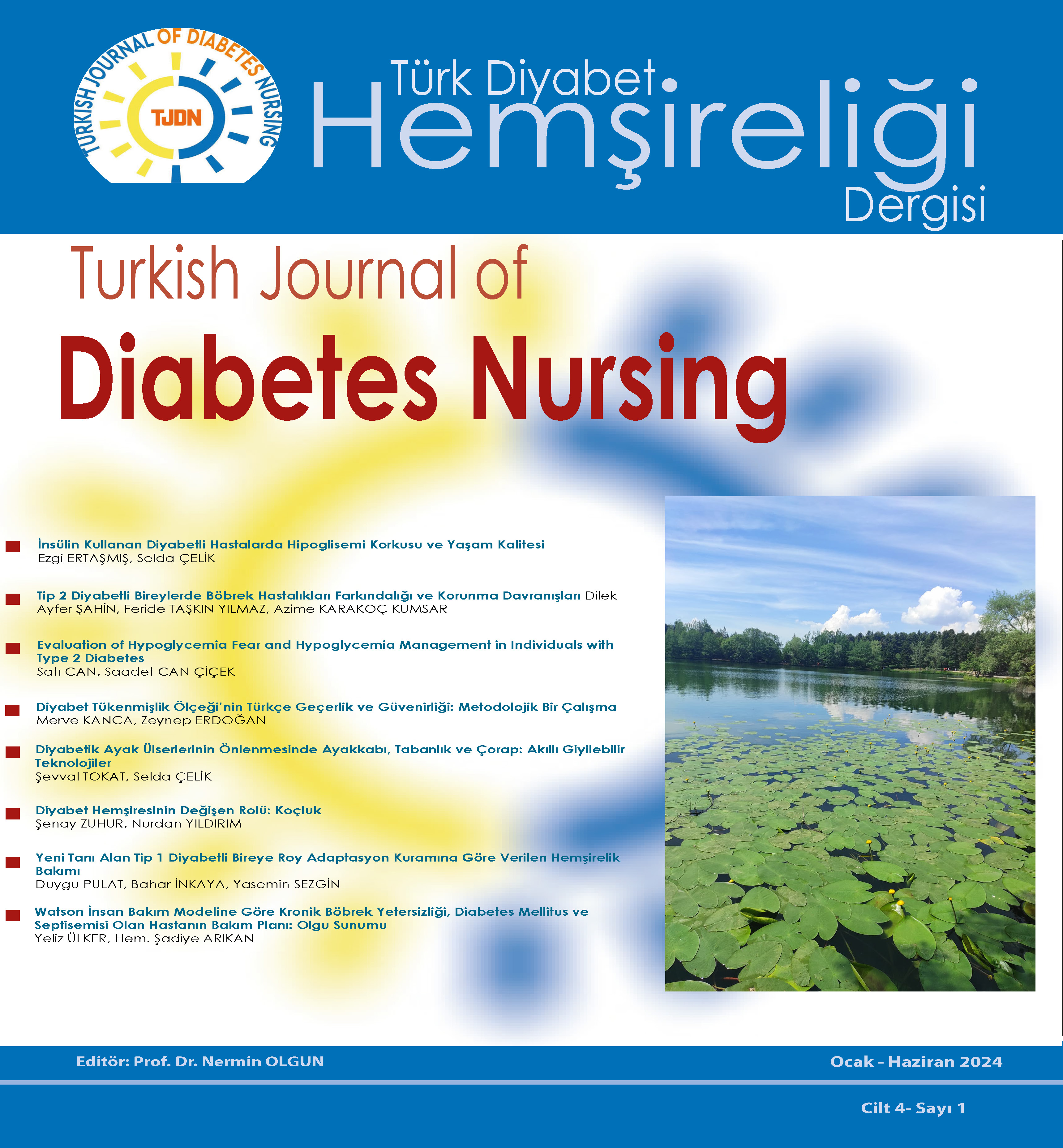Author :
Abstract
Amaç: Tip 2 diyabetli bireylerde hipoglisemi korkusu ve yönetiminin değerlendirilmesidir.
Gereç ve Yöntem: Kesitsel tipteki araştırmanın örneklemini 131 diyabetli birey oluşturdu. Çalışma Bolu’da bir eğitim araştırma hastanesi iç hastalıkları polikliniklerine başvuran tip 2 diyabetli bireylerle gerçekleştirildi. Veriler Diyabetli Birey Tanıtım Formu, Hipoglisemiye İlişkin Özellikler Formu ve Hipoglisemi Korku Ölçeği ile toplandı. Verilerin değerlendirilmesinde; frekans, aritmetik ortalama, standart sapma, medyan, minimum-maksimum, Mann-Whitney U test ile Kruskal Wallis H testi kullanıldı.
Bulgular: Katılımcıların yaş ortalaması 61.1±10.9 yıl, diyabet tanı süresi ortalaması 11.6±7.3 yıl, hipoglisemi korku ölçeği puanı 7.00±11.71 olarak belirlendi. Katılımcıların %56.5’inin son altı ayda hipoglisemi yaşadığı, %44.5’inin kan şekerinin düşme nedenini ve %27.0’ının kan şekeri düştüğünde ne yapması gerektiğini bilmediği belirlendi. Hipoglisemi korku ölçeğinde davranış alt boyut puanları kadınlarda, kaygı alt boyutu puanları diyabet dışında kronik hastalığı olanlarda, beslenme+insülin” tedavisi alanlarda, diyabet tedavi ve bakımına ilişkin eğitim alanlarda, hipoglisemi sırasında yanında biri olanlarda daha yüksek bulundu (p<0.05).
Sonuç: Katılımcıların yarısından fazlası hipoglisemi yaşamış ve yaklaşık üçte biri hipogliseminin yönetiminde ne yapması gerektiğini bilmemekte olup, hipoglisemi korku ölçeği puanı düşük bulunmuştur. Hipoglisemi glisemik kontrolü ve diyabet yönetiminini olumsuz etkilemektedir. Bu nedenle hipoglisemi konusunda eğitim ve farkındalığın arttırılması önemlidir. Her vizitte bireyin hipoglisemi durumunun, emosyonel tepkilerinin ve başetme yöntemlerinin değerlendirilmesinin yararlı olacağı düşünülmektedir.
Keywords
Abstract
Objective: To evaluate the fear and management of hypoglycemia in individuals with type 2 diabetes.
Method: The sample of the cross-sectional study consisted of 131 individuals with diabetes. The study was conducted with individuals with type 2 diabetes who applied to the internal medicine outpatient clinics of a training and research hospital in Bolu. Data were collected with the Diabetic Individual Introduction Form, Hypoglycemia-Related Characteristics Form, and Hypoglycemia Fear Scale. In evaluating the data; frequency, arithmetic mean, standard deviation, median, minimum-maximum, Mann-Whitney U test, and Kruskal Wallis H test were used.
Results: The average age of the participants was 61.1±10.9 years, the average duration of diabetes diagnosis was 11.6±7.3 years, and the hypoglycemia fear scale score was 7.00±11.71. It was determined that 56.5% of the participants had experienced hypoglycemia in the last six months, 44.5% did not know the reason for the drop in blood sugar, and 27.0% did not know what to do when their blood sugar dropped. Behavior subscale scores in the hypoglycemia fear scale were found to be higher in women, anxiety subscale scores were higher in those with chronic diseases other than diabetes, those receiving nutrition + insulin treatment, those receiving training on diabetes treatment and care, and those who had someone with them during hypoglycemia (p<0.05).
Conclusion: More than half of the participants experienced hypoglycemia and approximately one-third did not know what to do in the management of hypoglycemia, and the hypoglycemia fear scale score was found to be low. Hypoglycemia negatively affects glycemic control and diabetes management. Therefore, it is important to increase education and awareness about hypoglycemia. It is thought that it would be useful to evaluate the individual's hypoglycemia status, emotional reactions and coping methods at each visit.





